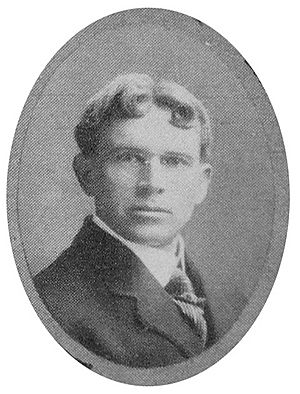Vernon Louis Parrington facts for kids
Quick facts for kids
Vernon Louis Parrington
|
|
|---|---|

Parrington, c. 1909
|
|
| Born | August 3, 1871 Aurora, Illinois |
| Died | June 16, 1929 (aged 57) Winchcombe, Gloucestershire, England |
| Nationality | American |
| Subject | American politics; American studies |
| Spouse | Julia Rochester Williams (married 1901) |
Vernon Louis Parrington (born August 3, 1871 – died June 16, 1929) was an American historian and writer. He is best known for his three-book series, Main Currents in American Thought. This important work won the Pulitzer Prize for History in 1928. It became one of the most influential books for American historians of his time.
Contents
Vernon Parrington's Life and Career
Vernon Louis Parrington was born in Aurora, Illinois. His family soon moved to Emporia, Kansas. He went to the College of Emporia and then Harvard University. He earned his degree from Harvard in 1893.
After college, Parrington saw how hard farmers in Kansas were struggling. This made him want to help ordinary people. He began to believe that society needed big changes.
He started teaching English at the College of Emporia. In 1897, he moved to the University of Oklahoma. There, he taught British literature and helped start the English department. He was also very active in campus life. He coached the football team, played on the baseball team, and edited the school newspaper.
In 1908, he left the University of Oklahoma. He then began a successful career at the University of Washington.
Parrington's Ideas About Society
When Parrington moved to the University of Washington in Seattle, his views became even stronger. He felt that big businesses were causing many problems. He wrote that his "hatred of that selfish system" became a main goal in his life. He believed that understanding money and how society worked was key to understanding life.
Founding American Studies
Parrington helped start a new way of studying American culture. This field is called American Studies. He introduced this idea with his 1927 book, Main Currents in American Thought.
This new way of studying America combined different subjects. It looked at American culture as a whole. It also focused on what made American culture special and unique. Other scholars like Perry Miller and F. O. Matthiessen helped grow this field.
Parrington wanted to explore how important ideas in American history developed. He looked at how these ideas were challenged. He also studied how they shaped American ideals and institutions. He focused on politics, economics, and social changes, not just literature.
Main Currents in American Thought
Parrington is most famous for his book, Main Currents in American Thought. This three-volume series was published in 1927. It looked at American history through a political lens, starting from colonial times. The book won the 1928 Pulitzer Prize for History.
In his book, Parrington described two main ideas in American history. One was the "elitist Hamiltonian" view, which favored strong leaders. The other was the "populist Jeffersonian" view, which supported ordinary people. Parrington clearly sided with the Jeffersonian view.
He also described three main periods in U.S. history. He saw democratic ideals as the main driving force behind these periods.
For about 20 years, Main Currents in American Thought was very important to American historians. Many scholars praised it. They saw it as a key book for understanding American history. These historians believed that economic and geographic forces were most important. They thought that ideas often hid deeper truths.
Parrington's ideas were very popular in the 1920s and 1930s. They helped shape modern liberalism in the United States. However, after the 1940s, his ideas became less popular. Some critics felt his views were too simple. They argued that he didn't fully appreciate complex literary figures.
Vernon Parrington's Coaching Career
Before becoming a famous writer, Parrington was also a football coach. He was the second head coach for the University of Oklahoma football team. He was the first faculty member to officially hold this coaching job.
He brought a new style of play and better organization to the team. During his four years as coach (1897-1900), his teams played 12 games. They won 9 games, lost 2, and had 1 tie. Parrington was the longest-serving coach among Oklahoma's first five coaches.
Today, the Parrington Oval at the University of Oklahoma is named after him. Parrington Hall at the University of Washington also honors his name.
Coaching Record
| Year | Team | Overall | Bowl/playoffs | ||||||
|---|---|---|---|---|---|---|---|---|---|
| Oklahoma Sooners (Independent) (1897–1900) | |||||||||
| 1897 | Oklahoma | 2–0 | |||||||
| 1898 | Oklahoma | 2–0 | |||||||
| 1899 | Oklahoma | 2–1 | |||||||
| 1900 | Oklahoma | 3–1–1 | |||||||
| Oklahoma: | 9–2–1 | ||||||||
| Total: | 9–2–1 | ||||||||
Vernon Parrington's Books
- The Connecticut Wits (1926)
- Main Currents in American Thought (1927)
- Sinclair Lewis, Our Own Diogenes (1927)
 | Leon Lynch |
 | Milton P. Webster |
 | Ferdinand Smith |

